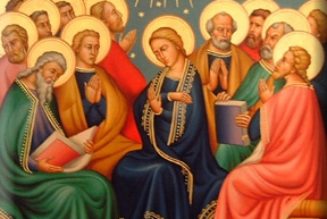
Why is the season called Lent?
Lent is the Old English word for spring. In almost all other languages, Lent’s name is a derivative of the Latin term quadragesima or “the forty days.”
Why is Lent approximately forty days long?
In the Bible, forty days is a traditional number of discipline, devotion, and preparation. Moses stayed on the mountain of God forty days (Ex. 24:18, 34:28). The Israelites’ spies were in the land of Canaan forty days (Num. 13:25). Elijah traveled forty days before he reached the cave where he had his vision (1 Kings 19:8). Nineveh was given forty days to repent (Jon. 3:4). And, most significantly for our Lenten observance, Jesus spent forty days in wilderness praying and fasting prior to undertaking his ministry (Matt. 4:2). Thus, it is fitting for Christians to imitate him with a forty-day period of prayer and fasting to prepare to celebrate the climax of Christ’s ministry, Good Friday (the day of the crucifixion) and Easter Sunday (the day of the Resurrection).
The Catechism of the Catholic Church states, “‘For we have not a high priest who is unable to sympathize with our weaknesses, but one who in every respect has been tested as we are, yet without sinning’ [Heb. 4:15]. By the solemn forty days of Lent the Church unites herself each year to the mystery of Jesus in the desert” (CCC 540).
What are fast and abstinence?
Under current canon law in the Western rite of the Church, a day of fast is one on which Catholics who are eighteen to sixty years old are required to keep a limited fast. In this country you may eat a single, normal meal and have two snacks so long as these snacks do not add up to a second meal. Children are not required to fast, but their parents must ensure they are properly educated in the spiritual practice of fasting.
A day of abstinence is a day on which Catholics fourteen years and older are required to abstain from eating meat. (Though under the current discipline of the Western rite of the Church, fish, eggs, milk products, and foods made using animal fat are permitted, they are not in the Eastern rites.) Their pastor can easily dispense those with medical conditions from the requirements of fast and abstinence.
Is there a biblical basis for abstaining from meat as a sign of repentance?
Yes. The book of Daniel states, “In the third year of Cyrus king of Persia . . . ‘I, Daniel, mourned for three weeks. I ate no choice food; no meat or wine touched my lips; and I used no lotions at all until the three weeks were over’” (Dan. 10:1-3).
Isn’t abstaining from meat one of the “doctrines of demons” Paul warned about in 1 Timothy 4:1-5?
When Paul warned of those who “forbid people to marry and order them to abstain from certain foods,” he had in mind people with the Manichean belief that sex is wrong and certain foods like meat are immoral. (Thus, the spiritual ideal for many modern New Agers is a celibate vegetarian, as in the Eastern religions.)
We know that Paul has in mind those who teach sex and certain foods are intrinsically immoral because he tells us that these are “foods that God created to be received with thanksgiving by those who believe and who know the truth. For everything God created is good, and nothing is to be rejected if it is received with thanksgiving, because it is consecrated by the word of God and prayer” (1 Tim. 4:3b-5).
Sex and all kinds of food are good things—which is why the Catholic Church has marriage for a sacrament and heartily recommends the practice of eating to its members. This is why it is fitting for these things to be given up as part of a spiritual discipline. Thus, Daniel gave up meat (as well as wine, another symbol of rejoicing), and Paul endorses the practice of temporary celibacy to engage in a special spiritual discipline of increased prayer (1 Cor. 7:5). By denying ourselves these good things, we encourage an attitude of humility, free ourselves from dependence on them, cultivate the spiritual discipline of sacrifice, and remind ourselves of the importance of spiritual goods over earthly goods.
In fact, if there was an important enough purpose, Paul recommended permanently giving up marriage and meat. Thus, he himself was celibate (1 Cor. 7:8). He recommended the same for ministers (2 Tim. 2:3-4) and for the unmarried in order to devote themselves more fully to the Lord (1 Cor. 7:32-34), unless doing so would subject them to great temptations (1 Cor. 7:9). Similarly, he recommended giving up meat permanently if it would prevent others from sinning (1 Cor. 8:13).
Since the Catholic Church requires abstinence from meat only on a temporary basis, it clearly does not regard meat is immoral. Instead, it regards it as the giving up of a good thing in order to attain a spiritual goal.
What authority does the Church have to establish days of fast and abstinence?
The authority of Jesus Christ. Jesus told the leaders of his Church, “Whatever you bind on earth will be bound in heaven, and whatever you loose on earth will be loosed in heaven” (Matt.16:19, 18:18). The language of binding and loosing was (in part) a rabbinic way of referring to the ability to establish binding halakah or rules of conduct for the faith community. (See the Jewish Encyclopedia: “Binding and loosing (Hebrew, asar ve-hittir) . . . Rabbinical term for ‘forbidding and permitting.’”) It is especially appropriate that the references to binding and loosing occur in Matthew, the “Jewish Gospel.”
The Jewish Encyclopedia continues:
The power of binding and loosing was always claimed by the Pharisees. Under Queen Alexandra, the Pharisees, says Josephus (Wars of the Jews 1:5:2), “became the administrators of all public affairs so as to be empowered to banish and readmit whom they pleased, as well as to loose and to bind.” . . . The various schools had the power “to bind and to loose”; that is, to forbid and to permit (Talmud: Chagigah 3b); and they could also bind any day by declaring it a fast day (Talmud: Ta’anit 12a). . . . This power and authority, vested in the rabbinical body of each age of the Sanhedrin, received its ratification and final sanction from the celestial court of justice (Sifra, Emor, 9; Talmud: Makkot 23b).
In this sense Jesus, when appointing his disciples to be his successors, used the familiar formula (Matt. 16:19, 8:18). By these words he virtually invested them with the same authority as that which he found belonging to the scribes and Pharisees who “bind heavy burdens and lay them on men’s shoulders, but will not move them with one of their fingers”; that is “loose them,” as they have the power to do (Matt. 23:2-4). In the same sense, [in] the second epistle of Clement to James II (Clementine Homilies, Introduction [A.D. 221]) Peter is represented as having appointed Clement as his successor, saying: “I communicate to him the power of binding and loosing so that, with respect to everything which he shall ordain in the earth, it shall be decreed in the heavens; for he shall bind what ought to be bound and loose what ought to be loosed as knowing the rule of the Church” (3:215).
Thus Jesus invested the leaders of this Church with the power of making halakah for the Christian community. This includes the setting of fast days (like Ash Wednesday).
To approach the issue from another angle, every family has the authority to establish particular family devotions for its members. If the parents decide that the family will engage in a particular devotion at a particular time (say, Bible reading after supper), it is a sin for the children to disobey and skip the devotion for no good reason. In the same way, the Church as the family of God, has the authority to establish its own family devotion, and it is a sin for the members of the Church to disobey and skip the devotions for no good reason. Of course, if the person has a good reason, the Church dispenses him.
In addition to Ash Wednesday, are any other days during Lent days of fast or abstinence?
Yes. All Fridays during Lent are days of abstinence. Also, Good Friday, the day on which Christ was crucified, is day of both fast and abstinence.
All days in Lent are appropriate for fasting or abstaining, but canon law does not require it. Such fasting or abstinence is voluntary.
Why are Fridays during Lent days of abstinence?
Because Jesus died for our sins on Friday, making it an especially appropriate day of mourning our sins by denying ourselves something we enjoy. (By the same token, Sunday—the day on which he rose for our salvation—is an especially appropriate day to rejoice.)
Are acts of repentance appropriate on other days during Lent?
Yes. The Code of Canon Law states, “All Fridays through the year and the time of Lent are penitential days and time throughout the universal Church” (CIC 1250).
Why are acts of repentance appropriate at this time of year?
Because it is the time leading up to the commemoration of our Lord’s death for our sins and the commemoration of his resurrection for our salvation. It is thus especially appropriate to mourn the sins for which he died. Humans have an innate psychological need to mourn tragedies, and our sins are tragedies of the greatest sort.
What are appropriate activities for ordinary days during Lent?
Giving up something we enjoy, engaging in physical or spiritual acts of mercy for others, prayer, fasting, abstinence, going to confession, and other acts expressing repentance in general.
Is the custom of giving up something for Lent mandatory?
No. However, it is a salutary custom, and parents or guardians may choose to require it, since the spiritual training of their children is their prime responsibility.
Why is giving up something for Lent such a salutary custom?
By denying ourselves something we enjoy, we discipline our wills so that we are not slaves to our pleasures. Just as over-indulging in the pleasure of eating leads to physical flabbiness, over-indulging in pleasure in general leads to spiritual flabbiness. When the demands of morality require us to refuse something pleasurable (such as sex outside marriage) or endure hardship (such as being scorned for the faith), spiritual flabbiness may well make us fail.
Is the denying of pleasure an end in itself?
No, it is only a means to an end. By training ourselves to resist temptations when they are not sinful, we train ourselves to reject temptations when they are sinful. We also express our sorrow over having failed to resist sinful temptations in the past. There are few better ways to keep our priorities straight than by denying ourselves things of lesser priority to show us that they are not necessary and focus our attention on what is necessary.
Can we deny ourselves too many pleasures?
Definitely. God made human life contingent on certain goods, such as food, and to refuse to enjoy enough of them has harmful consequences. For example, if we do not eat enough food, we can damage our bodies (and, in the extreme, even die). Just as there is a balance between eating too much food and not eating enough food, there is a balance involved in other goods.
If we deny ourselves too much, it may deprive us of goods God gave us in order that we might praise him or decrease our effectiveness in ministering to others. It can also constitute the sin of ingratitude by refusing to enjoy the things God wanted us to have because he loves us. If a child refused every gift his parent gave him, it would displease the parent; if we refuse gifts God has given us, it displeases God because he loves us and wants us to have them.
Aside from Ash Wednesday, what are the principal events of Lent?
There are a variety of saints’ days that fall during Lent, and some of these change from year to year, since the dates of Lent itself change based on when Easter falls. However, the Sundays during the Lenten season commemorate special events in the life of our Lord, such as the Transfiguration and his triumphal entrance into Jerusalem on Palm Sunday, which begins Holy Week. Holy Week climaxes with Holy Thursday, on which Christ celebrated the first Mass; Good Friday, on which he was crucified; and Holy Saturday—the last day of Lent—during which our Lord lay in the tomb before his resurrection on Easter Sunday.
Join Our Telegram Group : Salvation & Prosperity








